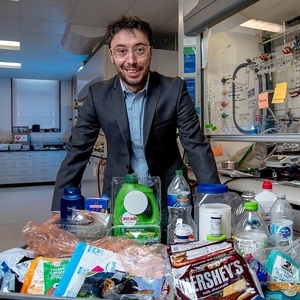DOE grant supports work to engineer recyclable bioplastic




SOURCE: University of Illinois Urbana-Champaign
March 11, 2022
BY University of Illinois Urbana-Champaign - The Grainger College of Engineering
The Department of Energy has granted $2 million over three years to Braskem America, University of Illinois Urbana-Champaign and Princeton University to develop plastic that can be recycled perpetually, reducing waste and pollution from single-use plastics.
This private-public effort is among seven supported by $13.4 million in DOE funding to reduce single-use plastics' carbon emissions and improve their recyclability through next-generation plastic technologies.
"Plastic packaging, which accounts for the majority of littered material, is currently impossible to recycle because it is made of multiple layers of material that cannot be separated," said Damien Guironnet, an expert in polymer chemistry at Illinois. "Our approach is to create a one-layer plastic that would achieve the properties as current multilayer packaging material — to finally make plastic packaging recyclable."
Advertisement
Advertisement
The team will focus their effort on redesigning polyethylene (PE) packaging material to produce plastic packaging that can be recycled infinitely or safely degrade in the environment. PE is used to create the majority of single-use plastic objects. In fact, more PE is produced annually by volume than any other plastic. The perks of PE are its low cost and mechanical strength.
But PE has poor oxygen barrier properties, which is problematic for packaging foods that are prone to spoil or protect medicines during transit. PE packaging uses extra layers to block oxygen — but these added layers also make the ensemble unrecyclable. Therefore, the team is reimagining how to increase the oxygen barrier of polyethylene to create packaging that can be recycled.
"We'll engineer the molecular structure to create a single-material plastic to achieve what can only be achieved today by multiple materials," said Richard Register, an expert in polymer structure-property relationships at Princeton. "The benefits are two-fold: reducing manufacturing complexity and enabling mechanical recycling of materials that today accumulate in landfills."
Beyond the design of new recyclable packaging material, the team will construct their material using Braskem's unique bio-polyethylene platform, a sustainable source of PE derived from biochemicals.
Advertisement
Advertisement
Ultimately, this private-public partnership stands to develop a bio-based, recyclable and biodegradable plastic packaging material for large-scale, end-consumer applications.
"I am excited by the prospect of designing a material that everyone will use but won't harm the environment," Guironnet said. "It is motivating to imagine eliminating the kind of plastics that would clutter our planet for hundreds of years and replacing it with a whole new plastic that can be recycled or safely degrade."
Related Stories
The U.S. Department of Energy Bioenergy Technologies Office (BETO) announced up to $23 million in funding to support research and development (R&D) of domestic chemicals and fuels from biomass and waste resources.
The U.S. DOE has announced its intent to issue funding to support high-impact research and development (R&D) projects in two priority areas: sustainable propane and renewable chemicals and algal system cultivation and preprocessing.
Sens. Sherrod Brown, D-Ohio, and Pete Ricketts, R-Neb., in August introduced the Renewable Chemicals Act, a bill that aims to create a tax credit to support the production of biobased chemicals.
The Chemical Catalysis for Bioenergy Consortium, a consortium of the U.S. DOE’s Bioenergy Technologies Office, has launched an effort that aims to gather community input on the development of new biomass processing facilities.
USDA on March 8 celebrated the second annual National Biobased Products Day, a celebration to raise public awareness of biobased products, their benefits and their contributions to the U.S. economy and rural communities.
Upcoming Events










